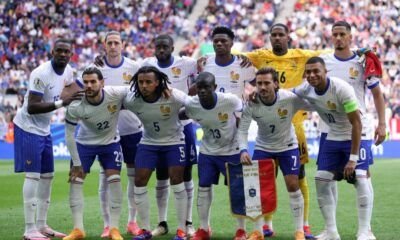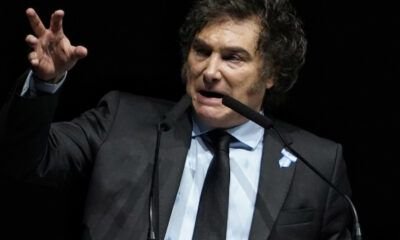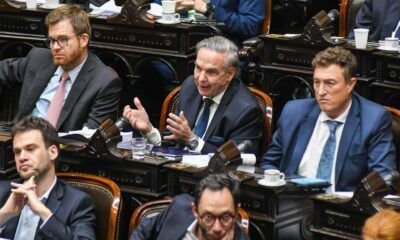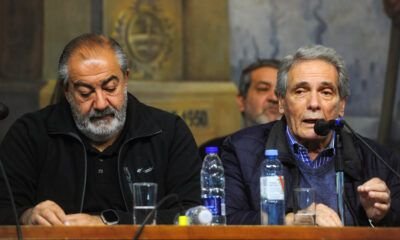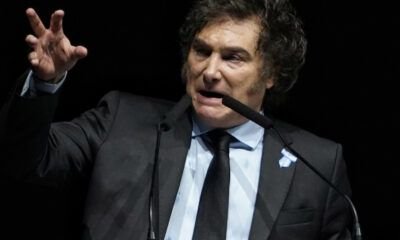INTERNACIONAL
Intento de golpe de Estado en Bolivia: detienen a un segundo ex jefe militar que estaba dentro del tanque militar que avanzó sobre el Palacio de Gobierno
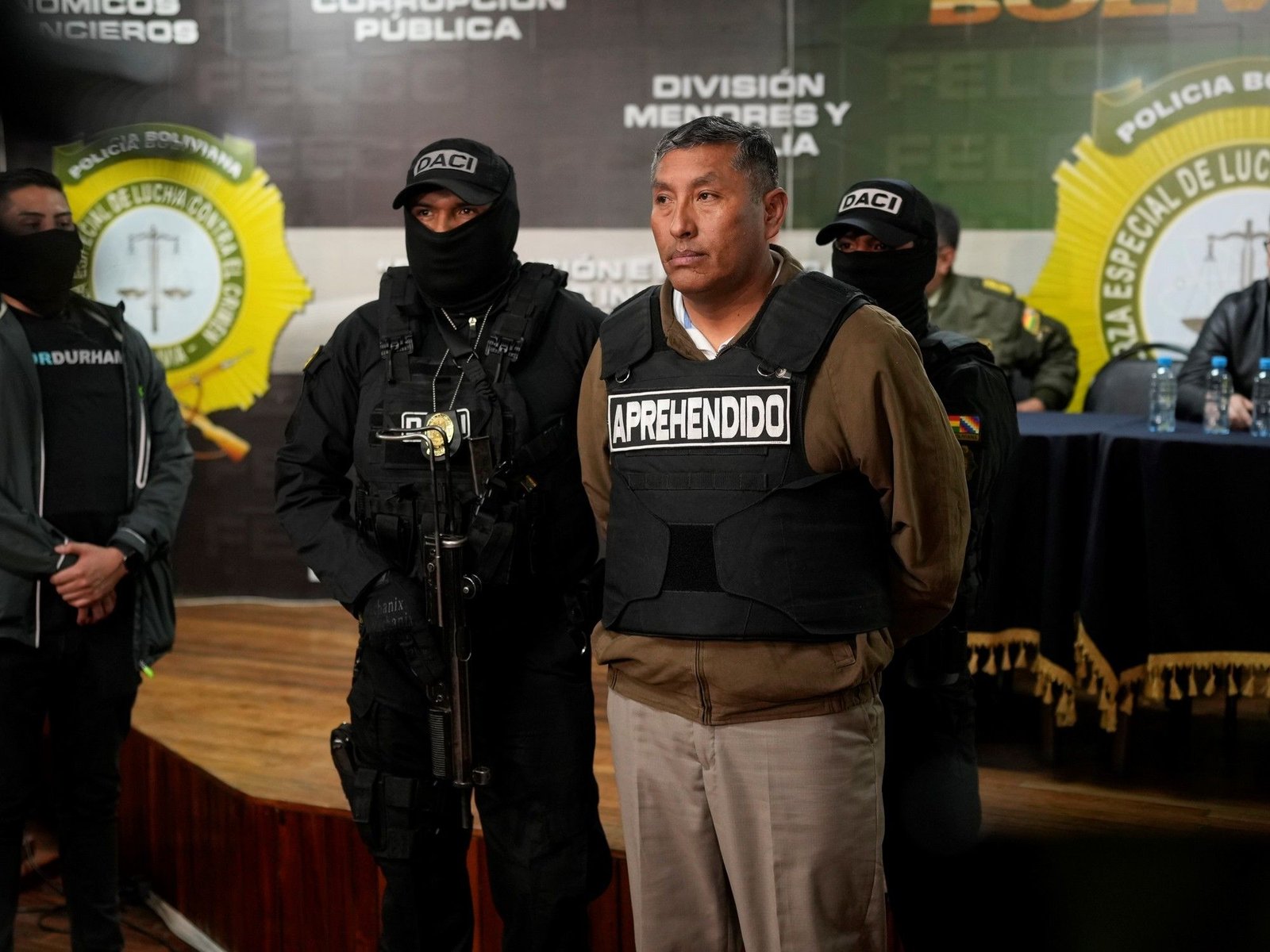
Luego de haber arrestado al jefe del Ejército y reemplazar a la cúpula, la policía de Bolivia detuvo a un segundo jefe militar, acusado por la fiscalía de terrorismo y alzamiento armado, durante un intento de golpe de estado contra el presidente Luis Arce.
El ministro de Gobierno del Interior, Eduardo del Castillo, anunció la captura del comandante de la Armada Boliviana (Marina), Juan Arnez Salvador, sin detallar las circunstancias de su detención.
Arnez fue presentado esposado en una conferencia de prensa, junto al ex jefe del Ejército, Juan José Zúñiga, cabecilla del movimiento militar.
Del Castillo señaló que Zúñiga y Arnez son «dos militares golpistas que intentaron destruir la democracia y la institucionalidad de nuestro país y fracasaron».
Explicó que ambos se encontraban en el interior de un tanque militar que intentó derribar las puertas de ingreso a Palacio de Gobierno, en la plaza de Armas de La Paz, donde el mandatario Arce tiene sus oficinas.
El gobierno de Arce destituyó este miércoles a Zúñiga y Arnez de sus cargos y nombró a nuevas autoridades.
La medida de reemplazo arrastró al comandante de la Fuerza Aérea Boliviana, Marcelo Zegarra, aunque no se dio detalles de su paradero.
Video
Máxima tensión en Bolivia: rompieron la puerta del Palacio Quemado
Zúñiga, quien comandó la movilización de uniformados en la sede de gobierno, argumentó que la medida era para «restablecer la democracia», usurpada -según él- por los políticos que se benefician del poder en beneficio propio.
Al cabo de una frenética jornada, el general Zúñiga fue arrestado en las afueras de un cuartel militar de La Paz y conducido a un vehículo policial bajo cargos de terrorismo y alzamiento armado, según la fiscalía que imputó los mismos cargos a Arnez.
El repudio de Argentina y las primeras palabras del embajador en La Paz
El Gobierno argentino condenó el levantamiento militar e intento de Golpe de Estado en Bolivia. Fue primero a través de un mensaje de la canciller Diana Mondino, en la que planteó que «la democracia no se negocia».
«Los gobiernos, sean buenos o malos, gusten o no, se cambian únicamente en las urnas. No se cambian con violentos golpes de Estado», remarcó Mondino en un posteo en la red social X (ex Twitter). Fue el único pronunciamiento directo de Argentina sobre la crisis que estalló en La Paz.
Ya casi entrada la madrugada del jueves, un comunicado de la Cancillería remarcó que la República Argentina «reafirma la defensa irrestricta de la democracia en la región y condena todo intento de quebrantarla».
Agregó el texto conversado entre el Palacio San Martín y la Casa Rosada que el Gobierno «repudia las movilizaciones irregulares de algunas unidades del Ejército boliviano y expresa su firme apoyo al Estado de Derecho, mientras remarca la importancia de sostener las instituciones democráticas en el Estado Plurinacional de Bolivia.»
INTERNACIONAL
France's right-wing National Rally looks to seize on recent electoral gains
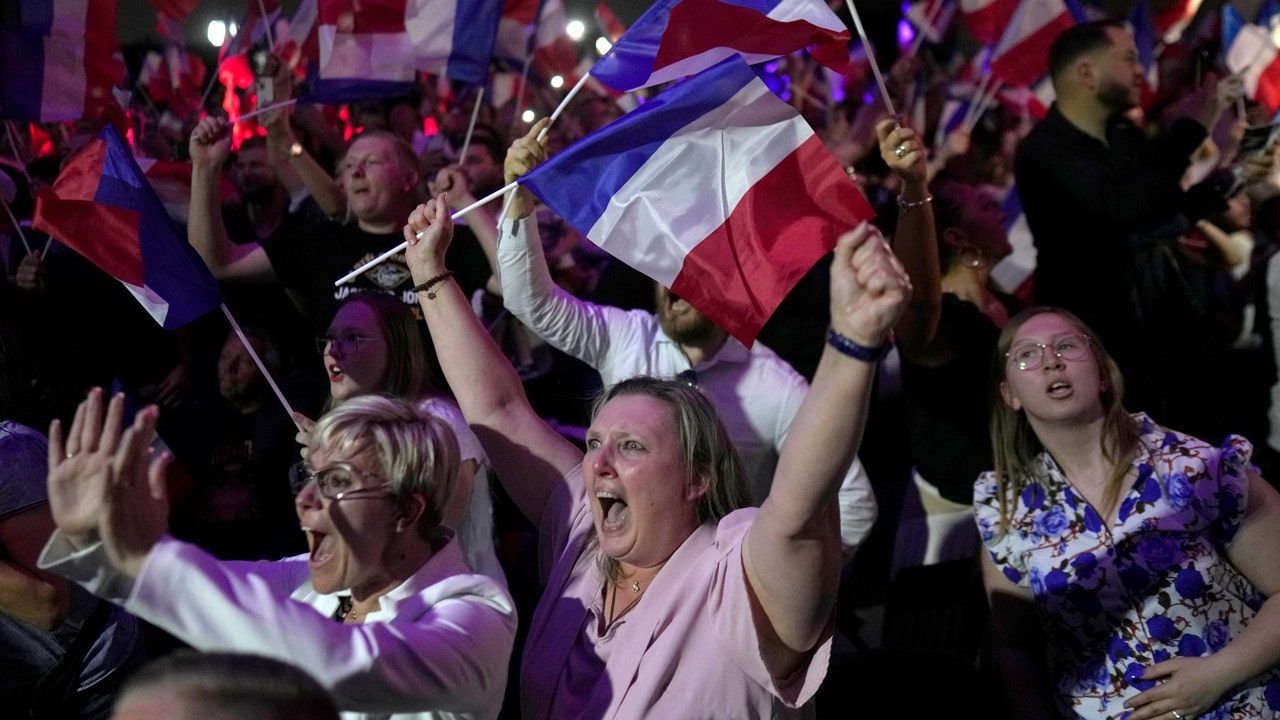
With the ultimate outcome still up in the air, France’s fiercely anti-immigration National Rally and opponents of the long-taboo far-right party scrambled Monday to capitalize on an indecisive first round of voting in surprise legislative elections.
Round one on Sunday propelled the National Rally closer than ever to government but also left open the possibility that voters could yet block its path to power in the decisive round two. France now faces two likely scenarios in what promises to be a torrid last week of high-stakes campaigning.
Strengthened by a surge of support that made it the round-one winner but not yet the overall victor, the National Rally and its allies could secure a working majority in parliament in the final round next Sunday. Or they could fall short, stymied at the last hurdle by opponents who still hope to prevent the formation of France’s first far-right government since World War II.
RIVALS MOVE TO BLOCK FRANCE’S RIGHT-WING NATIONAL PARTY’S ELECTION MOMENTUM
Both scenarios are fraught with uncertainty for France and its influence in Europe and beyond.
«Just imagine the image of France — the country of human rights, the country of enlightenment — which suddenly would become a far-right country, among others. This is inconceivable,» said Olivier Faure, a Socialist who comfortably held onto his legislative seat.
The far right tapped into voter frustration with inflation and low incomes and a sense that many French families are being left behind by globalization. National Rally leader Marine Le Pen’s party campaigned on a platform that promised to raise consumer spending power, slash immigration and take a tougher line on European Union rules. Its anti-immigration agenda has contributed to many French citizens with immigrant backgrounds feeling unwelcome in their own country.
Getting 289 or more lawmakers in the 577-seat National Assembly would give Le Pen an absolute majority and the tools to force President Emmanuel Macron to accept her 28-year-old protege, Jordan Bardella, as France’s new prime minister.
Such a power-sharing arrangement between Bardella and the centrist president would be awkward and invite conflict. Macron has said he will not step down before his second term expires in 2027.
Getting close to 289 seats might also work for Le Pen. By promising posts in the government, she may win over enough new lawmakers to her side.
A National Rally government in France would be an additional triumph for far-right and populist parties elsewhere in Europe that have steadily carved out places in the political mainstream and taken power in some countries, including Hungary. Hungarian Prime Minister Viktor Orbán will hold the European Union’s rotating presidency for the next six months.
Supporters of French far right leader Marine Le Pen react after the release of projections based on the actual vote count in select constituencies , Sunday, June 30, 2024 in Henin-Beaumont, northern France. French voters propelled the far-right National Rally to a strong lead in first-round legislative elections Sunday and plunged the country into political uncertainty, according to polling projections. (AP Photo/Thibault Camus)
But the first round of the French vote was also sufficiently undecided to offer up the alternative possibility that France’s complex, two-round system could also leave no single bloc with a clear and workable majority.
That would plunge France into unknown territory.
However, Le Pen’s opponents still view that scenario as more appealing than victory for her party, which has a history of racism, xenophobia, antisemitism and hostility toward France’s Muslims — as well as historical ties to Russia and a more adversarial attitude toward the EU.
«We are faced with a ‘Trumpization’ of the French democracy,» warned lawmaker Sandrine Rousseau, an ecologist also reelected in round one. «The second round will be absolutely crucial.»
The election, made intense by the high stakes and compressed time frame, has overshadowed preparations for Paris to host the Olympic Games, which open in less than a month.
Candidates who did not win outright in round one but qualified for round two have until 6 p.m. Tuesday to decide whether to stay in the race or withdraw. By pulling out, opponents of the National Rally might divert votes to other candidates better positioned to beat the far right next Sunday.
Some candidates announced of their own accord that they were stepping aside, making a defeat of the National Rally their top priority. In other cases, party leaders set the direction, saying they would withdraw candidates in some districts in hopes of blocking Le Pen’s path to power. She inherited her party, then called the National Front, from her father, Jean-Marie Le Pen, who has multiple convictions for racist and antisemitic hate speech.
Overall, the National Rally and its allies won a third of the nationwide vote Sunday, official results showed. The New Popular Front, a left-wing coalition of parties that joined together in the quick, three-week campaign to beat the far right, got 28% and was followed in third place by Macron’s centrist camp with 20%. But the 577 seats are elected by districts. So while nationwide results provide an overall picture of how each camp fared, they do not indicate exactly how many seats the groups will get in the end.
Bardella urged voters to give him a majority, saying they face a choice between left-wing «incendiaries» who pose «an existential threat» to France and his party’s offer of a «responsible break» with Macron’s era.
Support for the National Rally and the New Popular Front was so strong that they both won more than 30 seats outright on Sunday by taking more than 50% of the vote in some districts. That means there will be no second round in those districts.
Turnout — at nearly 67% — was the highest since 1997, arresting nearly three decades of deepening voter apathy for legislative elections and, for a growing number of French people, politics in general.
Macron dissolved the National Assembly and called the snap election on June 9, after a stinging defeat at the hands of the National Rally in French voting for the European Parliament. The deeply unpopular and weakened president gambled that the far right would not repeat that success when the country’s own fate was in the balance.
But Macron’s plan backfired. He is now accused, even by members of his own camp, of having opened a door for the National Rally by calling voters back to the ballot box, especially when so many are angry over inflation, the cost of living, immigration and at Macron himself.
If the National Rally can form a government, it has promised to dismantle many of Macron’s key domestic and foreign policies, including his pension reform that raised the retirement age. It also says it would stop French deliveries of long-range missiles to Ukraine in the war against Russia.
CLICK HERE TO GET THE FOX NEWS APP
National Rally opponents fear for civil liberties if the party takes power. It plans to boost police powers and curtail the rights of French citizens with dual nationality to work in some defense, security and nuclear-industry jobs. Macron himself warned that the far right could set France on a path to civil war.
-
POLITICA3 días ago
El presidente Javier Milei atacó al Foro de Periodismo Argentino y escala la pelea del gobierno contra los periodistas
-
POLITICA1 día ago
Fuerte reclamo de la oposición dialoguista al Gobierno por la crisis económica tras la sanción de la Ley Bases
-
POLITICA23 horas ago
Cristina Kirchner reapareció y criticó al Gobierno: “El superávit fiscal es cada vez más trucho”
-
ECONOMIA2 días ago
Los precios del supermercado en Argentina ya son más caros que en España
-
POLITICA2 días ago
La CGT contra el impuesto a las Ganancias: «El ajuste lo pagan los trabajadores»
-
POLITICA16 horas ago
Los mercados castigan a Milei, la ayuda de los «dinosaurios» y una anomalía del Senado















